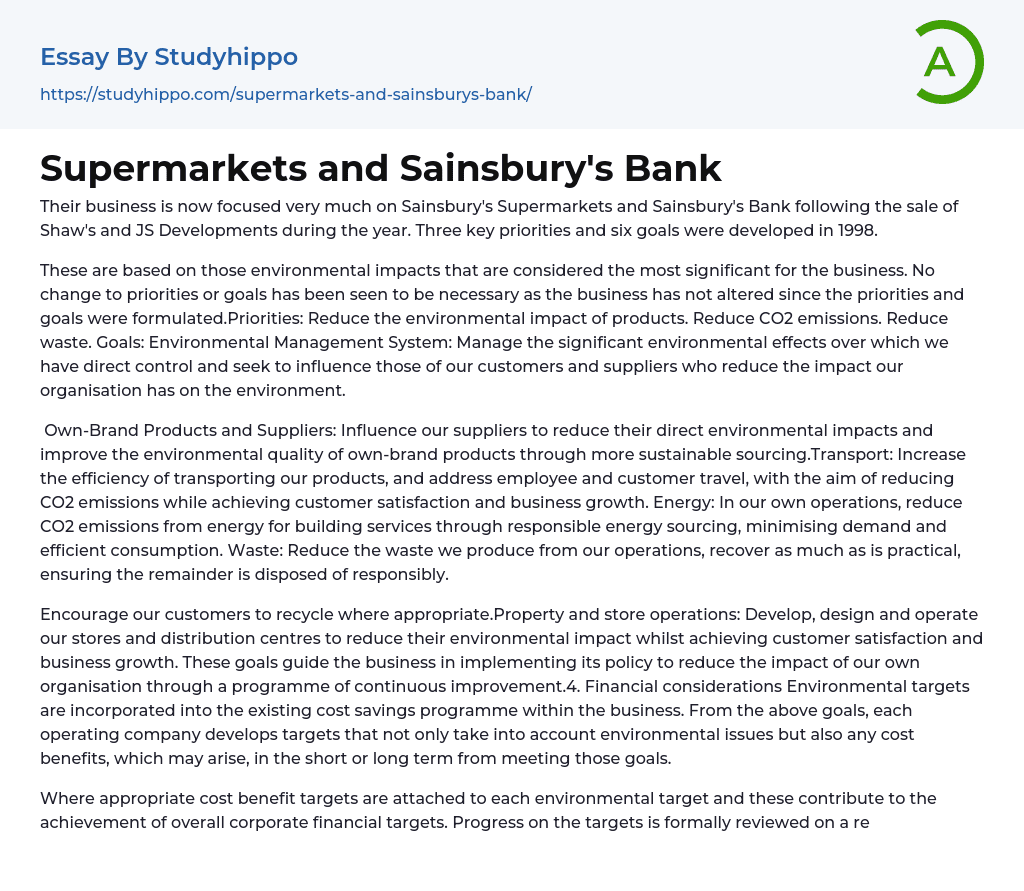After selling Shaw's and JS Developments in the year, their attention has shifted towards focusing on Sainsbury's Supermarkets and Sainsbury's Bank. In 1998, they established three primary objectives and six targets.
The organization's Environmental Management System aims to reduce its impact on the environment by managing both direct and indirect environmental effects. This includes reducing product impact, CO2 emissions, and waste. These priorities have remained unchanged since their establishment and are consistently pursued in the business operations. The goal is to minimize the organization's environmental impact while also influencing customers and suppliers to do the same.
Our goal is to advance sustainability in all aspects of our operations, encompassing our own-brand items and supply chain. We collaborate with suppliers to prioritize sustainable sourcing, minimize environmental impact, and maintain product quality. Additionally, we pledge to enhance the energy efficiency of transportation
...while decreasing employee and customer travel to reduce CO2 emissions and ensure customer contentment and business growth.
We strive to decrease CO2 emissions from building services by utilizing responsible energy sourcing, limiting demand, and promoting efficient consumption. Our ultimate aim is to decrease waste by recuperating as much as feasible while disposing of any remaining waste responsibly.
Our company is dedicated to promoting recycling and conducting our operations in an environmentally responsible way. We prioritize customer satisfaction and business growth, while continuously working to improve our policies to reduce our impact on the environment. Our cost savings program includes environmental targets, where each operating company sets goals that consider environmental concerns and potential cost benefits over time.
Cost benefit targets are attached to every environmental target, and these targets contribute to overall corporate financial goals. The progress of these targets
is regularly reviewed from both financial and environmental perspectives. Operating companies can use cost savings to enhance their environmental controls. In the past year, several projects have yielded both cost savings and environmental benefits. For instance, energy savings projects have saved roughly 1.25 million within the past year and are expected to save 3 million in total.
Due to efficiency improvements in Sainsbury's supply chain, the distance traveled was reduced in the current year resulting in savings of approximately 71/2 million and nearly 4,800 tonnes of CO2 by Sainsbury's HGV fleet.
- Bank essays
- Banking essays
- Corporate Finance essays
- Credit Card essays
- Currency essays
- Debt essays
- Donation essays
- Enron Scandal essays
- Equity essays
- Financial Accounting essays
- Financial Crisis essays
- Financial News essays
- Financial Ratios essays
- Financial Services essays
- Forecasting essays
- Foreign Exchange Market essays
- Free Market essays
- Gold essays
- Investment essays
- Legacy essays
- Loan essays
- Market Segmentation essays
- Money essays
- Personal finance essays
- Purchasing essays
- Retirement essays
- Shareholder essays
- Stock Market essays
- Supply And Demand essays
- Venture Capital essays
- Customer essays
- Customer Satisfaction essays
- Customer Service essays
- Target Market essays
- Board Of Directors essays
- Brand Management essays
- Business Ethics essays
- Business Management essays
- Change Management essays
- Comparative Analysis essays
- Decision Making essays
- Dispute Resolution essays
- Knowledge Management essays
- Leadership essays
- Leadership and Management essays
- Manager essays
- Operations Management essays
- Performance Management essays
- Product Management essays
- Project Management essays




